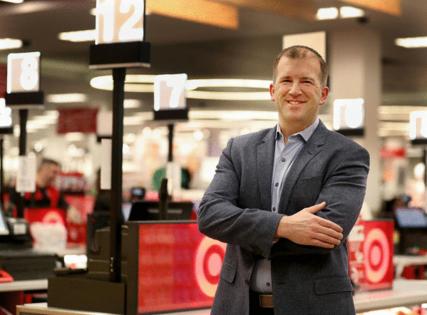Who is Target's next CEO, Michael Fiddelke?
Published in Business News
Target Corp. on Wednesday named Michael Fiddelke as its new chief executive, promoting the company veteran who has served as chief operating officer since February.
Fiddelke, 49, will succeed Brian Cornell, who led the Minneapolis-based retailer for 11 years through a period of significant growth and recent challenges.
The promotion will take place in February, after the all-important holiday season, when Cornell will transition to executive board chair.
Yes, the succession has been widely anticipated after Target reorganized its leadership structure in May, giving Fiddelke additional responsibilities overseeing the company’s newly formed Enterprise Acceleration Office aimed at improving operational efficiency.
The company also announced in May that Christina Hennington, former chief growth officer and potential CEO contender, would depart.
“It is clear that Michael is the right leader to return Target to growth, refocus and accelerate the company’s strategy, and reestablish Target’s position as a leader in the highly dynamic and fast-moving retail environment,” said Christine Leahy, lead independent director of Target’s board, in a news release.
Fiddelke started in 2003 as a finance intern and then moved up through the ranks, serving in positions in finance, merchandising, human resources and operations. Before being promoted to chief operating officer, he was chief financial officer from 2019 to 2024. He also had served as senior vice president of operations. He sits on the board of Target subsidiary Shipt, a same-delivery service acquired by the retailer in 2017.
“We put a lot of time in talent development,” Cornell told the Star Tribune in June. “Michael’s a great example. He’s been in HR. He’s been in store operations. He’s had roles in merchandising. He was our CFO. So it gives him a great background to understand the total company.”
Fiddelke said in a Target post when he was promoted to chief operating officer that he grew up on a farm in Manchester, Iowa, about 50 minutes west of Dubuque, Iowa. “It was a small farm, but my dad made sure I had chores to do every morning before I headed to school. That’s where the work ethic set in,” he said.
He received a bachelor’s degree in industrial engineering from University of Iowa in 1999, and an MBA from Northwestern University’s Kellogg School of Management in 2004.
He worked for three years at Deloitte Consulting early in his career.
The average age for a Fortune 500 CEO in 2024 was 57, according to Madison Trust Co. Meta’s Mark Zuckerberg is 41. Cornell was 55 when hired as the chief executive of Target. Bob Ulrich, Target’s longest serving CEO who’s credited with developing the retailer’s brand and seeing it through massive expansion, took over at 43.
He lives in the Twin Cities-area with his family and has served on the board of Minnesota Children’s Museum.
On a media call Tuesday, Fiddelke said his top priorities as CEO are to return Target to its previous status as a leader in style and design, improve consistency of in-store and online experience and increase technology use across the business.
“We are urgently acting to make changes to reclaim that authority in some categories where we haven’t had it. A category like home, we haven’t been happy with our performance over the last few years,” Fiddelke said. “We saw explosive growth during the pandemic. And on the heels of that growth, we focused a bit too much on the core assortments and lost some of our fashion and design leadership.”
Fiddelke inherits a company facing multiple headwinds.
The leadership transition comes as Target works to regain momentum after several quarters of inconsistent performance. The company has emphasized its focus on value offerings and improving its supply chain efficiency to better compete with rivals including Walmart and Amazon.
“Regaining the market’s credibility will be critical, but it’s achievable. History offers numerous examples of turnarounds under a new leader,” wrote Michael Lasser, UBS analyst, in a research note. “In our view, Target has the foundation and scale to stage a recovery, making the stock a longer-term opportunity.”
Target’s comparable sales declined the last two quarters as consumers pulled back on discretionary spending amid persistent inflation.
The retailer also dealt with boycotts related to its Pride merchandise last year and its decision to pull back on certain diversity initiatives in January.
Investors have pressed Target to demonstrate greater urgency in addressing operational inefficiencies and adapting to changing consumer behaviors.
“Michael’s tenure gives him unmatched enterprise insight and a base of strong team trust. But what sets him apart is how he combines those strengths with a ‘fresh eyes’ mindset, challenging the status quo to evolve how the business operates, differentiates and delivers long-term value,” Leahy said.
According to a filing with the Securities and Exchange Commission Wednesday, Fiddelke’s new pay package as CEO hasn’t been approved by Target’s board of directors yet but is expected to be approved in the next few days and disclosed in an additional SEC filing.
Fiddelke made $3 million last year as the chief financial officer and executive vice president of Target. That pay included a $900,000 salary and $1.2 million from previously issued restricted stock that vested during the year.
In a 2024 post by Target alongside his COO promotion, Fiddelke said it’s a combination of curiosity and listening.
“I try to draw out the voice that I think a conversation needs, even if it’s not there,” he said. “We talk so much about the power of an inclusive culture, but that power only happens if you hear those diverse perspectives and create an environment of trust where it can help shape the decision making.”
(Staff writer Patrick Kennedy contributed to this reporting.)
©2025 The Minnesota Star Tribune. Visit at startribune.com. Distributed by Tribune Content Agency, LLC.












Comments